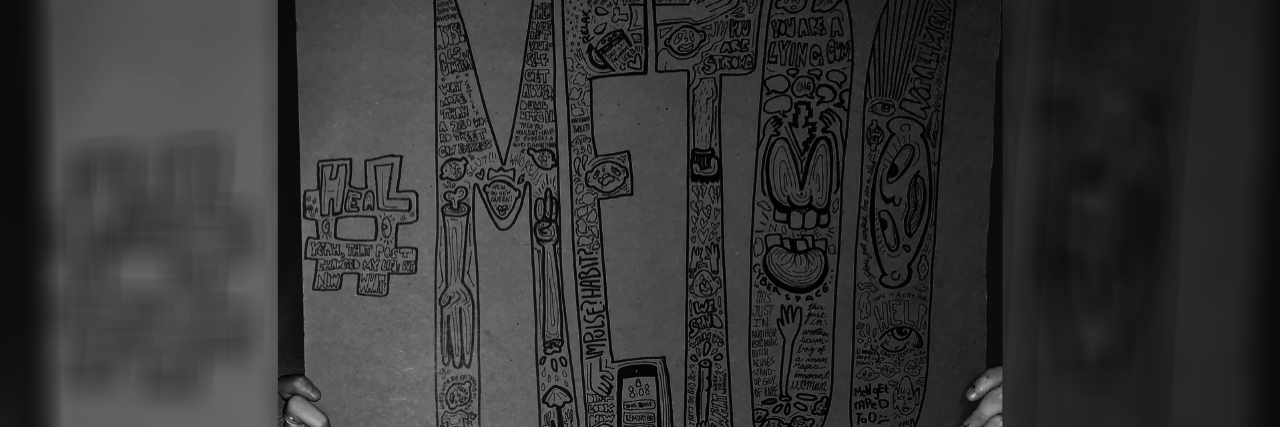On Being Raped When Believing Survivors Was Fashionable
Editor's Note
If you’ve experienced domestic violence or emotional abuse, sexual abuse or assault, the following post could be potentially triggering.
You can contact The National Sexual Assault Telephone Hotline at 1-800-656-4673.
You can contact The National Domestic Violence Hotline online by selecting “chat now” or calling 1-800-799-7233.
You can also contact the Crisis Text Line by texting “START” to 741741.
“Do you want to come over later, to my house? Watch American Beauty in the dark?” — Lyrics from “Gum” by Mooseblood, a song that my abuser repeatedly used to manipulate me.
On October 29, 2017, Anthony Rapp’s rape allegations against Kevin Spacey reached the public sphere. Even if I wasn’t aware that these allegations would be part of the catalyst of a nation-wide movement to affirm sexual assault survivors, I felt the magnitude of their impact in my core. I entered into an abusive relationship exactly one year and two days prior to this date, and I was just beginning to process what happened to me after the relationship ended in January of 2017. This was my sign — my go-ahead to start talking about the torment that I had faced at the hands of my abuser. It seemed to be a sign for other sexual assault survivors as well, because the #MeToo movement became nationally recognized shortly afterward.
Getting this societal approval to start telling my story made me feel invincible. I would talk about my experience with anyone who would listen. My openness gave my story recognition; I won a National Gold Medal for an art piece that I had created about my experience, which I proudly accepted at Carnegie Hall. I had mastered the art of not saying too much but saying just enough to feel the relief that came with sharing my story. I didn’t want to attract the attention of my abuser as I was just 17 when I was raped, and we still had classes together at the local high school. Regardless, I felt that I could fall back on the comfort of being believed if he did become violent toward me for speaking out. Just nine months earlier, I would have never dreamt of being able to come forward about my abuse.
In the midst of this fairytale version of events, however, my abuser was tormenting me from afar. He would sit directly behind me during study hall and breathe down my neck for the entire period, prompting me to beg my school counselor to let me switch classes (a feat that was rarely ever approved by the administration). He would park close to my car every morning before school so he could gather his friends after school to point at me and watch me drive away after school had ended. He even tried to spread rumors around the school that I was the one who abused him. I think that the worst of it, though, was that he found ways to send me songs that reminded him of me.
I knew my abuser for six years prior to the day he raped me. I was only 12 when I met him at our middle school orientation. He strung me along off and on throughout those six years, and would always send me songs to tell me things that he was too “shy” to tell me himself. It started with sappy, alternative-style love songs, but when he started getting more controlling, it would graduate to songs about being possessive over a woman, being violent towards a partner, and even preferring masturbation to a clingy girlfriend. This practice did not cease after the relationship ended in a sick attempt by him to continue to string me along or, when I started to speak out, to keep me quiet.
I do not know how I would have survived the continued abuse throughout my high school career without the impact of the #MeToo movement. Without it, the secret of my abuse looming over me would have been deafening. I was “fortunate” enough to have been emotionally, physically and sexually abused during a time where it was in vogue to uplift survivors. Because celebrities were using #MeToo in their tweets — because Lady Gaga brought 50 sexual assault survivors on stage to sing with her at the Oscars, and because Larry Nassar will spend the rest of his life in prison due to his victims being believed when they challenged an elite Olympic organization — I was able to heal. I hope that believing sexual assault survivors will not be written off as a fad. In 10 years, I hope the bravery behind an accusation is still met with an outpouring of support. But if somehow we lose our way and the #MeToo movement ends up in the back of all of our closets with our shoulder pads and our Walkmans, I never stop fighting for our stories. Expediting the healing of survivors happens not just from being believed, but knowing the culture of support is there before coming forward. I will be the safety net for the next generation of scared, broken 17-year-olds. There is still work to do.
Image via contributor

